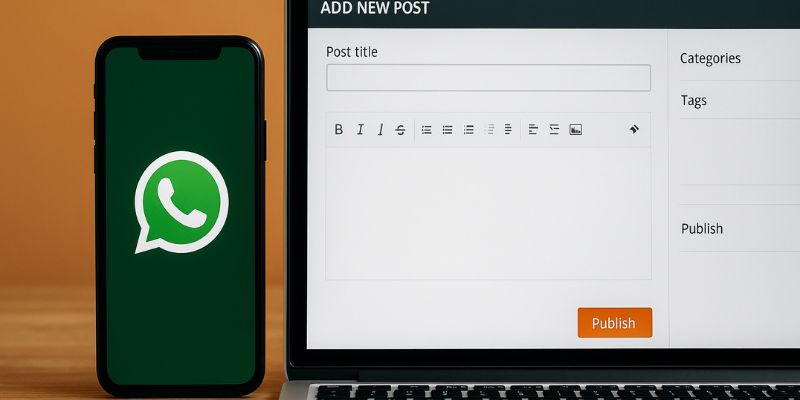Connect WhatsApp with Content Systems to Improve Customer Interaction
In today’s fast-paced digital world, businesses are constantly searching for innovative ways to enhance customer interaction. One such approach is integrating WhatsApp with content systems. This integration not only streamlines communication but also enriches the customer experience. In this article, we’ll explore the benefits, methods, and impacts of connecting WhatsApp with content systems.
Why Connect WhatsApp with Content Systems?
WhatsApp is one of the most popular messaging platforms worldwide, boasting over 2 billion users. By integrating it with content systems, businesses can tap into this vast user base, ensuring that they meet their customers where they are most active. This connection fosters seamless communication, faster response times, and personalized interactions.
Benefits of Integrating WhatsApp with Content Systems
- Enhanced Customer Engagement: Customers prefer platforms they are familiar with. By using WhatsApp, businesses can engage with their audience on a platform they already use daily.
- Improved Response Times: With automated responses and instant notifications, businesses can ensure swift replies to customer inquiries.
- Personalized Communication: Integration allows for tailored messages based on customer preferences and past interactions, leading to a more personalized experience.
- Centralized Data Management: Content systems can consolidate customer data from WhatsApp, providing businesses with valuable insights into customer behavior and preferences.
- Cost-Effective Solution: Compared to traditional customer service channels, WhatsApp is a cost-effective way to communicate with customers globally.
How to Integrate WhatsApp with Content Systems
Integrating WhatsApp with content systems requires a strategic approach. Here are the steps involved:
- Select the Right Tools: Choose a reliable integration platform that supports WhatsApp API and is compatible with your existing content systems.
- Set Up WhatsApp Business API: Register for the WhatsApp Business API, which allows businesses to send notifications and respond to customer inquiries on a large scale.
- Design Customer Interaction Flows: Plan and design how communications will flow. Determine the types of messages, triggers, and automated responses.
- Test the Integration: Before going live, conduct thorough testing to ensure that the system works seamlessly and that messages are delivered correctly.
- Launch and Monitor: Once the system is live, continuously monitor interactions to refine and optimize the customer experience.
Real-World Examples of Successful Integration
Many businesses have successfully integrated WhatsApp with their content systems, leading to improved customer satisfaction and increased sales.
Example 1: Retail Industry
A global retail giant integrated WhatsApp with its content management system to send personalized product recommendations. This led to a 30% increase in customer engagement and a 20% boost in sales.
Example 2: Customer Support
A tech company used WhatsApp to handle customer queries, reducing response times by 50% and improving customer satisfaction scores significantly.
Challenges and Solutions in Integration
While the benefits are clear, integrating WhatsApp with content systems can pose challenges. Businesses may face technical hurdles, data privacy concerns, and integration complexities.
- Technical Challenges: Ensure that your technical team is well-equipped to handle API integration and troubleshoot any issues.
- Data Privacy: Implement robust data protection measures to comply with privacy regulations and protect customer data.
- Complex Integration: Work with experienced integration partners who can simplify the process and ensure a seamless setup.
Impact on Customer Interaction and Business Growth
Integrating WhatsApp with content systems significantly impacts customer interaction. It offers a more engaging and personalized experience, leading to higher customer retention rates. Additionally, businesses can gather valuable insights into customer behavior, helping them tailor their marketing and service strategies more effectively.
Moreover, the integration can drive business growth by expanding reach and opening up new markets. With WhatsApp’s global user base, businesses can interact with customers across different regions, enhancing their global presence.
Conclusion
Connecting WhatsApp with content systems is a strategic move for any business looking to enhance customer interaction. It offers numerous benefits, from improved engagement and personalized communication to streamlined data management and business growth. By understanding the integration process and addressing potential challenges, businesses can successfully leverage this powerful combination to achieve their customer interaction goals.
Frequently Asked Questions
How does WhatsApp integration improve customer service?
WhatsApp integration allows for instant communication, automated responses, and personalized interactions, enhancing the overall customer service experience.
What are the costs associated with WhatsApp integration?
Costs vary depending on the integration platform and scale of operations, but WhatsApp is generally a cost-effective communication tool compared to traditional channels.
Is WhatsApp integration secure?
Yes, with proper encryption and data protection measures, WhatsApp integration can be secure. Businesses must comply with data privacy regulations to safeguard customer information.
Can small businesses benefit from WhatsApp integration?
Absolutely. Small businesses can use WhatsApp to reach customers efficiently, provide personalized service, and compete with larger companies.
What industries can benefit the most from WhatsApp integration?
Industries like retail, customer support, travel, and hospitality can greatly benefit from integrating WhatsApp with their content systems.
How long does it take to integrate WhatsApp with content systems?
The integration timeline depends on the complexity of the system and the expertise of the integration team, ranging from a few weeks to several months.
What is the role of the WhatsApp Business API in integration?
The WhatsApp Business API enables businesses to send messages at scale, manage communications, and integrate with existing content systems efficiently.
